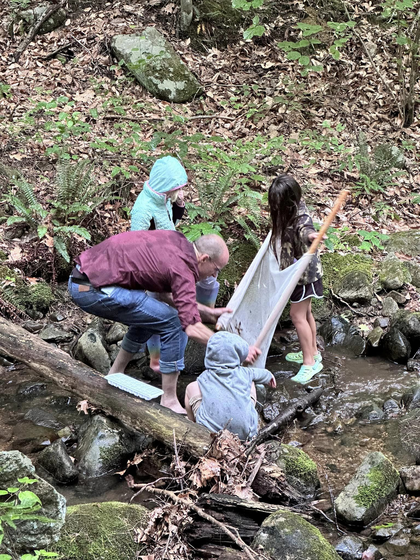In This Story

Honors College faculty members bring the principles of civic engagement and inclusion that they teach in the classroom to the broader community through acts of community service.
On Wednesday, June 21st, Honors College Director of Communications Richard Todd Stafford taught youths in the Warren County Izaak Walton League’s “Walton Wednesday” program about water quality and the use of benthic macroinvertebrates as indicators of pollution.
The Warren County, Virginia Izaak Walton League is an organization that has worked for over 90 years to protect the natural resources in Virginia’s Northern Shenandoah Valley by advocating for clean water, healthy soil, conservation, and outdoor recreation. Walton Wednesdays is a program organized by the group to encourage youths between two and thirteen years of age to have fun outdoors while learning about environmental science and outdoor recreation.
Stafford brings the Honors College’s emphasis on experiential learning to this volunteer work.
Sharing some of his expertise at Walton Wednesdays for the third consecutive year, he offered an interactive classroom session intended accessibly introduce concepts of water pollution, water quality monitoring, and indicator species to a group with a wide age range. Stafford then facilitated a hands-on experience monitoring water pollution. The students in Walton Wednesdays assessed pollution in a freshwater creek by gathering and counting which benthic macroinvertebrates inhabit the stream, using a protocol developed by the Virginia Save Our Streams program, an initiative of the Izaak Walton League, to assess water quality. By collecting, identifying, and sorting the benthic macroinvertebrates in the stream using this protocol, his students were able to calculate a stream health score.
This real-world experience enabled participants to understand that the indicators of water pollution might often be things that would otherwise be overlooked. In doing so, his students come to appreciate humans’ impact on the local streams and creeks often extends beyond what they immediately notice. Dr. Stafford notes that the process helps to “make the issue of water pollution more vivid for these young students and also gives them a chance to really appreciate that we can’t always see whether or not the water is polluted.”
Stafford's contribution to Walton Wednesdays is part of his broader commitment to public engagement around environmental issues. He serves as the Second Vice President of the Warren County Izaak Walton League and also is on the board of Friends of the North Fork of the Shenandoah River, a non-profit organization focused on preserving a key watershed in the Shenandoah Valley.

